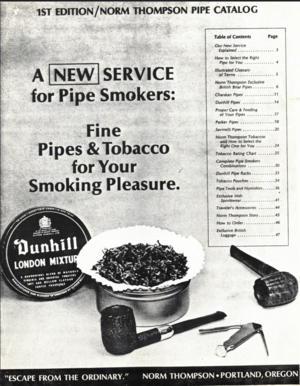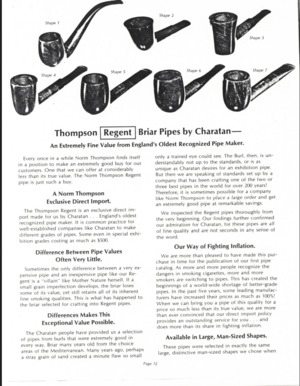Thompson, Norm: Difference between revisions
(Created page with "== Brief History == thumb|First Edition Catalogue, Courtesy Andrew Stangl File:Norm_T_Catalogue2.png|thumb|First Edition Catalogue, Courtesy...") |
No edit summary |
||
| Line 1: | Line 1: | ||
[[File:Norm_T_Catalogue1.png|thumb|First Edition Catalogue, Courtesy Andrew Stangl]] | [[File:Norm_T_Catalogue1.png|thumb|First Edition Catalogue, Courtesy Andrew Stangl]] | ||
[[File:Norm_T_Catalogue2.png|thumb|First Edition Catalogue, Courtesy Andrew Stangl]] | [[File:Norm_T_Catalogue2.png|thumb|First Edition Catalogue, Courtesy Andrew Stangl]] | ||
Norman Anchor Thompson, Sr. (known as "Norm Thompson") was an immigrant from Britain. He had settled in Salt Lake City before fighting for Canada in World War I. After the war he lived briefly in Los Angeles before settling in Portland, Oregon. Norm Thompson started a mail order only business in 1949 as a way to sell his homemade flies for fly-fishing by placing an advertisement in Field & Stream. I understand tobacco products were sold via the mail order business, as well, to a limited degree. Around 1951 he handed over the mail order business to Peter Alport, his son-in-law. Alport worked to expand the company's product offerings beyond fly-fishing items and into clothing and other outdoor merchandise, plus he developed the company's slogan of Escape from the ordinary. | |||
Norm Thompson would go on to own seven pipe shops and later two nightclubs during World War II.[6] Thompson retired after the war as owner of the nightclubs and tobacco shops.[5] | |||
The | The company was founded by namesake [6] where | ||
He During his tenure, Norm Thompson opened its first retail store in 1959, located in Northwest Portland.[5] Namesake Norm Thompson died in 1968 from complications related to his exposure to mustard gas during his World War I military service in Europe.[6] | |||
Revision as of 18:50, 15 March 2022
Norman Anchor Thompson, Sr. (known as "Norm Thompson") was an immigrant from Britain. He had settled in Salt Lake City before fighting for Canada in World War I. After the war he lived briefly in Los Angeles before settling in Portland, Oregon. Norm Thompson started a mail order only business in 1949 as a way to sell his homemade flies for fly-fishing by placing an advertisement in Field & Stream. I understand tobacco products were sold via the mail order business, as well, to a limited degree. Around 1951 he handed over the mail order business to Peter Alport, his son-in-law. Alport worked to expand the company's product offerings beyond fly-fishing items and into clothing and other outdoor merchandise, plus he developed the company's slogan of Escape from the ordinary.
Norm Thompson would go on to own seven pipe shops and later two nightclubs during World War II.[6] Thompson retired after the war as owner of the nightclubs and tobacco shops.[5]
The company was founded by namesake [6] where
He During his tenure, Norm Thompson opened its first retail store in 1959, located in Northwest Portland.[5] Namesake Norm Thompson died in 1968 from complications related to his exposure to mustard gas during his World War I military service in Europe.[6]

